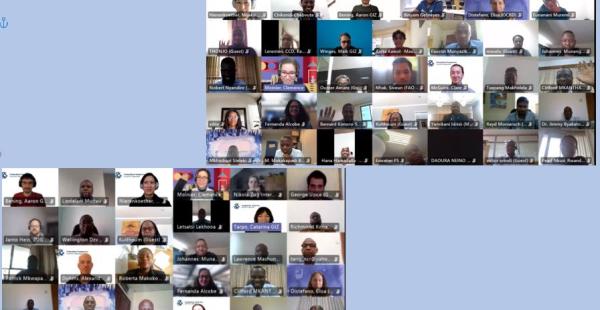
PATPA Anglophone African Regional Group Virtual Workshop on Adaptation Reporting via the BTR
Under the Partnership on Transparency in the Paris Agreement (PATPA), three virtual workshop sessions were held from February 22nd to 24th, 2022 to facilitate peer-to-peer learning on adaptation reporting under the UNFCCC among experts from the Anglophone Africa region. The workshop sessions provided a platform for attendees to understand the process and information required to report on adaptation through the Biennial Transparency Report (BTR), which will be due to be submitted by developing countries for the first time in 2024.
Over the three consecutive workshop days, 111 attendees participated in the virtual setting. Out of the 111 attendees, 87 were country representatives from 28 countries and 24 were participants from 10 international organisations (excl. PATPA & facilitators). 36% of the participants were female.
Through a series of presentations, interview panels, break-out group sessions, and plenaries, participants exchanged on their experiences with the planning and reporting processes which feed into the BTR, including the challenges they face and context-specific solutions.
Over the three days, some key takeaways were highlighted:
- The BTR will be the most complete reporting document available, though some of its sections overlap with Adaptation Communications (ADCOM) and National Communications (NC). ADCOM and NC are both more flexible and can have a forward-looking component, as opposed to the BTR
- While reporting on adaptation via BTRs is not mandatory, they will be critical to inform the Global Stocktake on a regular basis
- Countries can avoid unnecessary burden associated with multiple reporting documents by maintaining a narrow focus, exploiting synergies across mechanisms, and aligning it with other reporting requirements
- Countries that face significant lack of capacity and/or data availability are not required to have a complex Monitoring and Evaluation (M&E) system to begin the development of their BTR process
- M&E systems can be developed and improved over time. Begin by asking simple questions: Has this action been implemented? What stage of the proposed timeline is this action? What are the barriers to implementation?
- Data availability remains a significant challenge for reporting in general in the region
- Early stakeholder engagement supported strong buy-in at regional and local levels; however, a lack of investment in stakeholder buy-in was noted as having created significant barriers to data and knowledge sharing
From the PATPA secretariat, we would like to thank all distinguished speakers from South Africa, Ghana, Eswatini, Kenya, Namibia as well as representatives of the Adaptation Committee, UNEP DTU (recently renamed as UNEP Copenhagen Climate Centre)/ICAT, UNFCCC Secretariat, the GIZ Climate Policy Support Project, the London School of Economics and Political Science, and the NAP Global Network. This workshop was supported with the technical advice by the NAP Global Network and Ricardo Energy & Environment.
The concept note and agenda, the workshop report and the complete presentations of each day can be downloaded on the upper right margin of this article. It is also possible to download the presentations of each addressed subject separately by clicking on the links below:
- Adaptation information arrangements under the UNFCCC and the Paris Agreement - Funanani Muremi, Adaptation Committee member
- Adaptation M&E and adaptation reporting - Timo Leiter, Grantham Research Institute on Climate Change and the Environment
- Adaptation related information to be included in Biennial Transparency Reports - Motsomi Maletjane and Matti Goldberg, Adaptation Division UNFCCC Secretariat
- Adaptation Reporting in Ghana - Juliana Bempah, Ghana
- Adaptation reporting through the BTR - Thomas W. Dale, ICAT/ UNEP DTU Partnership (renamed as UNEP Copenhagen Climate Centre)
- Adaptation-mitigation nexus - Clémence Moinier, Ricardo E&E
- Communicating Adaptation Action in Eswatini - Minky Groenewald, Eswatini
- Kenya’s NAP progress Report - Lerenten Lelekoitien, Kenya
- South Africa’s Monitoring, evaluation and reporting for adaptation - Tlou Ramaru, South Africa
- Adaptation Communications (ADCOMs): Country experiences and lessons learnt - Maik Winges, GIZ

